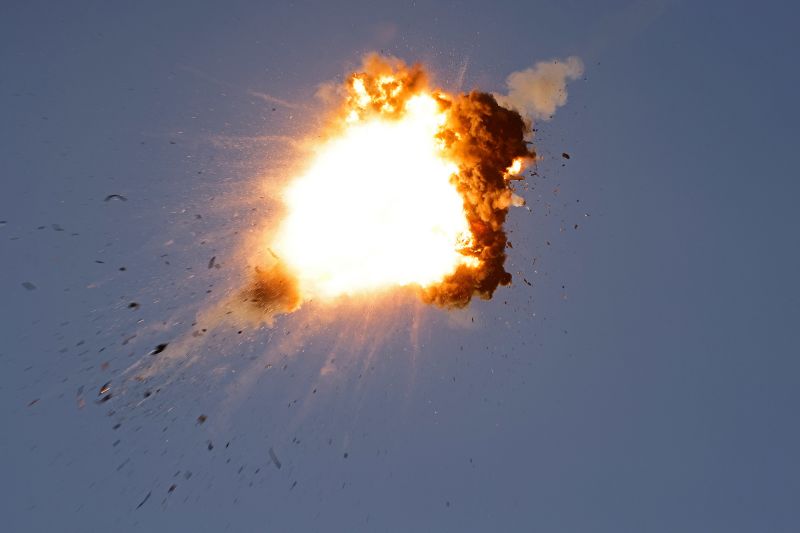For nearly a month, people in Lebanon and Israel braced for a wider war. A deadly rocket strike from Lebanon last month on the town of Majdal Shams in the Israeli-occupied Golan Heights was followed by an Israeli retaliatory strike that killed Hezbollah’s top commander in southern Beirut.
The powerful Iran-backed group vowed to respond. The threat triggered a slew of flight cancelations on both sides of the border, a chorus of governments imploring their citizens to leave Lebanon and Israel, and a breathless diplomatic effort to avert an escalation that Western governments feared would spark a regional conflict.
On Sunday morning, Hezbollah said it had delivered its anticipated response by launching hundreds of drones and Katyusha rockets, Soviet-era short-range projectiles.
The swarm of airborne weapons, it said, sought to overwhelm Israel’s vaunted air defense systems and pave a path for its targets: 11 Israeli military sites in northern Israel and the occupied Golan Heights. Israel’s Prime Minister Benjamin Netanyahu said all of Hezbollah’s drone’s were intercepted.
Israeli officials said that it had pre-emptively struck Hezbollah targets overnight to prevent a much wider attack, saying it hit many rocket launchers in Lebanon.
Three people were killed in those Israeli attacks, according to the Lebanese Ministry of Health, which does not distinguish between civilians and combatants.
The cross-border fire on Sunday morning marked a significant escalation after 11 months of hostilities between Hezbollah and Israel. But it appears to have dampened fears of a wider war, for now.
In Israel, authorities soon lifted security restrictions in the country’s northern-most territory, known as the upper Galilee. In Lebanon, Hezbollah said it had concluded attacks on Israel for the day.
This signals the resumption of the low-intensity conflict at the border. It also seems to mark the conclusion of the anticipated Lebanese escalation that brought the Middle East, once again, to the brink of all-out war. Hezbollah has said this was the “first phase” of its response but has been scant on the details of a follow-up. The phrase may be rhetorical – the group is prone to keeping its threats open-ended.
But while Hezbollah’s promised response appears to be largely out of the way, Israel must continue to wait for another threat to transpire: Iran’s vowed “revenge” for the killing of Hamas chief Ismail Haniyeh in Tehran, which it blamed on Israel.
A region on a knife’s edge
After the attacks in Beirut and Tehran at the end of last month, Western and Israeli intelligence officials, diplomats and analysts scrambled to figure out what the retaliations promised by Iran and its most powerful non-state partner might look like.
It sparked shuttle diplomacy with the United States, the United Kingdom and France urging Hezbollah and Iran to exercise restraint. This appeared to expedite another round of talks over a ceasefire and hostage release deal in Gaza, in a bid to ward off another escalation by the Iran-led axis, which has repeatedly conditioned stopping its attacks on Israel and its allies on an end to the Israeli offensive in Gaza.
The talks to end the war continue to move at a glacial pace, despite intense diplomatic efforts by the US. But the latest escalation has shown that neither Iran nor its allied non-state fighting groups in the region can stomach the prospect of a wider war.
Hezbollah had repeatedly vowed to retaliate to any Israeli strike in Beirut with an attack on major urban centers in Israel. Yet, whether by design or due to Israel’s claimed pre-emptive strikes, it fell short of that threat. Its stated targets remain within the border area that has been the site of the hostilities since October and the short-range Soviet-era rockets it used have been a mainstay of Hezbollah’s attacks on Israeli forces for decades.
The risk of an all-out conflict appears to be significantly lower in the aftermath of Sunday’s cross-fire. Yet Iran’s open-ended threat will continue to contribute to the war of nerves that has defined much of the low-grade conflict between the Tehran-led axis and Israel, and the region will remain on a knife’s edge for as long as the war in Gaza goes on.


